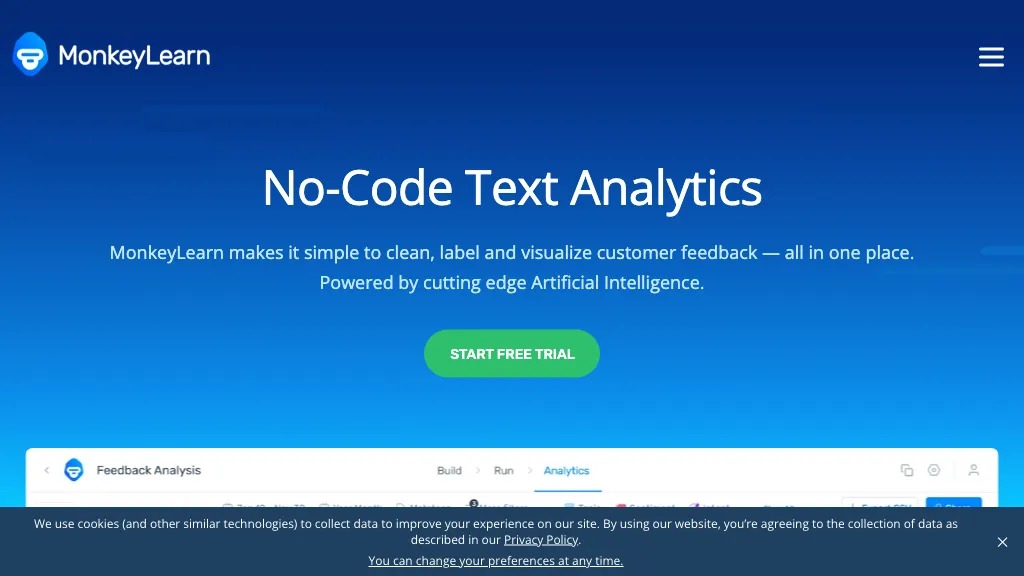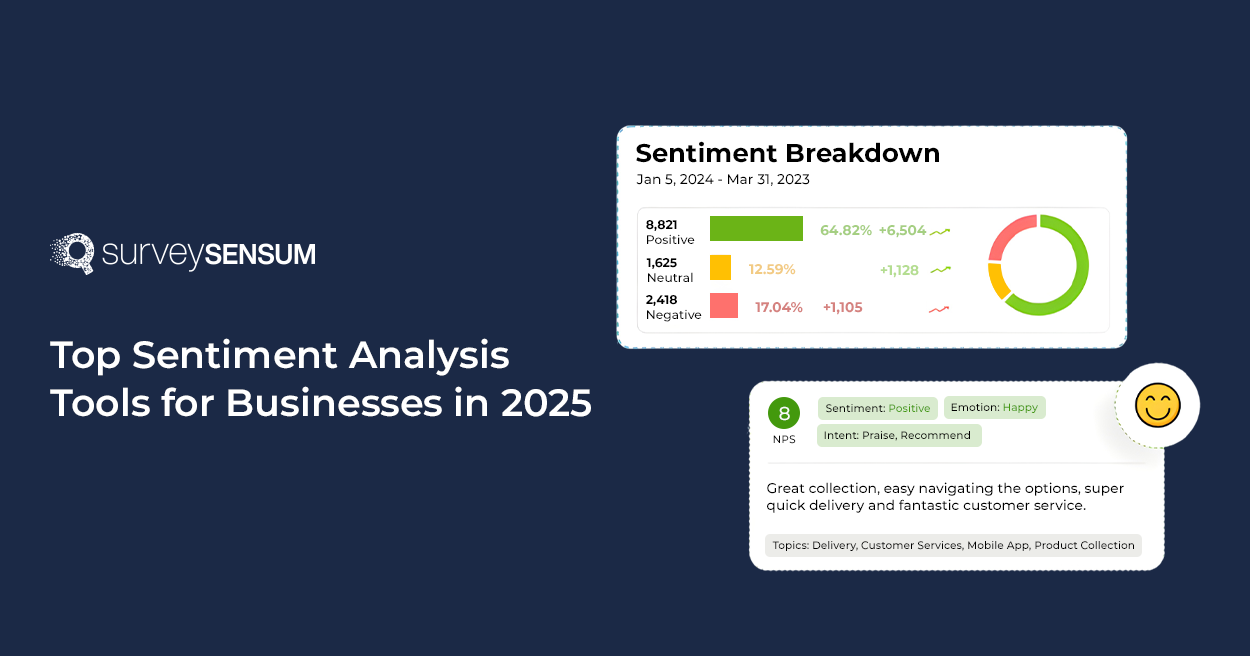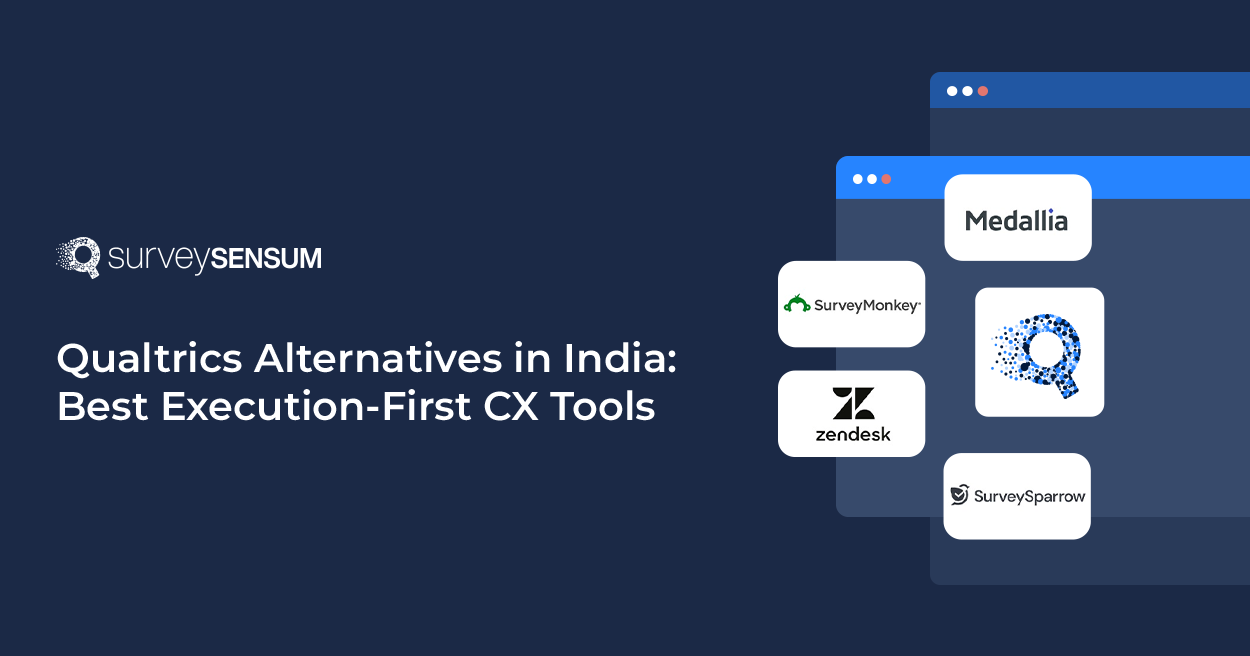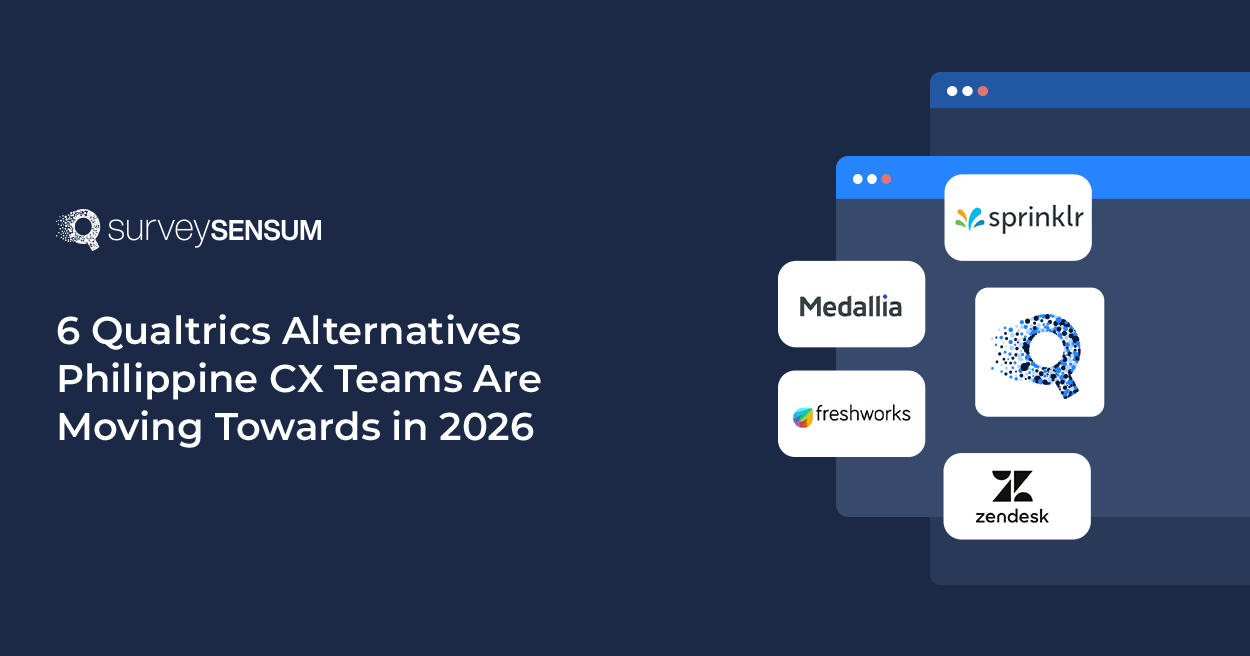

80% of the data businesses generate is unstructured, and a significant portion of it comes directly from customers.
Yes, that’s almost all your data..
From social media posts and product reviews to emails and open-ended survey responses, this feedback holds valuable insights into how customers truly feel about your brand.
But, this data is messy, subjective, and constantly evolving.
That’s where sentiment analysis steps in. It helps businesses decode the emotional tone behind customer feedback at scale.
But when it comes to choosing the right sentiment analysis tool for your business, the market is flooded with them. So in this blog post, I’ll walk you through a few of the best sentiment analysis tools out there.
Things to Evaluate While Choosing a Sentiment Analysis Tool
Here are the key features to look for when selecting the right tool for your organization:
- Ability to Train your AI Model: Your sentiment analysis tool should speak like you do. Choose a platform where you can train its AI on your business jargon, categories, and more and refine it as you go. This way you both accuracy, speed, and scalability.
- Availability of an AI Copilot for On-Demand Insights: An AI copilot lets you ask direct business questions like “Why did my CSAT drop last week?” or “What’s trending among detractors this month?” and receive clear, actionable answers. No dashboard overload, no endless filtering, just real-time insights that help you act faster.
- AI & NLP-Based Analysis: Look for a tool that goes beyond surface-level sentiment. Modern solutions use artificial intelligence and natural language processing to pick up on complex emotions — things like sarcasm, frustration, or subtle dissatisfaction that older tools often miss. The best part? These systems keep learning over time, so their accuracy improves the more you use them.
- Multilingual Support: Your customers don’t all speak the same language, and your sentiment analysis tool shouldn’t either. Whether feedback comes in English, Spanish, Japanese, or any other language, the tool should be able to accurately interpret tone and context. This helps you understand your audience better across markets and cultures.
- Real-Time Analysis: Things can change fast, whether it’s a product update, a viral post, or discovering the optimal TikTok posting time to maximize exposure. You’ll want a sentiment tool that can track and adapt instantly. Real-time insights help you stay ahead of the curve, respond proactively, and turn feedback into timely actions that matter.
- Easy Integration with Business Tools: Integrating sentiment analysis with your CRMs, chatbots, feedback platforms, etc. ensure that insights show up where your team is already working — making them easier to act on without adding extra steps.
Now that we’ve talked about the features of the best sentiment analysis tools, let’s take a look at the top 8 sentiment tools that made it to our A-list.
Best Sentiment Analysis Software to Look Out for in 2025
I’ve curated a list of sentiment analysis tools that can pull information from multiple sources and use techniques like NLP sentiment analysis to get actionable insights. They also use AI sentiment analysis, which makes them powerful and super handy for various types of businesses. Let’s take a look at the best sentiment analysis software.
1. SurveySensum

SurveySensum’s AI-powered Text and Sentiment Analytics software helps businesses truly understand what their customers are saying and feeling across all touchpoints. These include in-app feedback, chats, Play Store reviews, emails, surveys, social channels, and more.
It offers powerful capabilities like sentiment analysis to capture the full range of customer emotions in real time, automated tagging & word spotting to categorize feedback by topics or sentiments, predictive analytics to forecast customer behavior, and real-time reports to surface actionable insights.
It automatically analyzes thousands of open-ended responses, spots common themes, and highlights key trends and emotions within seconds —with AI
It also features a real-time ticketing system that auto-flags critical issues and assigns them to relevant teams for quick resolution.
Best Features
- Sentiment Analysis: Analyze and understand the full range of customer emotions from unstructured feedback in real time. Group negative sentiments, spot common issues, and uncover root causes.
- Automated AI-Based Tagging & Word Spotting: Easily tag and group feedback by sentiments, topics, or product features – all with AI.
- AI Model Trained for You by You: AI so smart that you can train it as per your business requirements.
- Real-time Reports: Automate sending reports to your stakeholders directly to their mailbox – weekly, fortnightly, or monthly.
- Pre-built Templates: Access 100+ customizable, industry-specific templates for NPS, CSAT, CES, and more, making it easy to launch professional surveys quickly.
- Dedicated CX Expertise: Get hands-on support from CX experts who guide you from implementation to taking action on the insights efficiently.
Pros:
- Sentiment analysis in multiple languages
- Analyzes 10,000+ responses in seconds with 99% accuracy
- Automatically tags feedback by sentiment and category
- Links sentiment trends with CX metrics like NPS, CSAT, and CES
- Highlights common themes and emotions with visual dashboards
- Tracks sentiment across channels like surveys, chats, and emails
- AI Co-Pilot to answer any questions you have
- Topic drill down with cross-tab analysis
Cons:
- Currently limited integrations, but more are coming soon to the platform
Pricing
SurveySensum is an affordable feedback management tool that even offers a free plan with unlimited surveys, users, and questions. If you need more features, paid plans start at just $299 per year.
Ever feel swamped by customer feedback? Let SurveySensum’s AI do the heavy lifting – automatically tagging, categorizing, and analyzing sentiment with 99% accuracy so you can focus on making improvements, not sifting through data.
2. Sprout Social

Sprout Social is a one-stop shop for social media management. It offers emotion detection AI and granular sentiment analysis. It monitors millions of industry discussions on various platforms to gain insight into people’s true emotions. You can clearly see what customers think because Sprout’s AI can detect sentiment even in complicated phrases and emoticons.
To react more quickly, view the average sentiment surrounding your brand, identify patterns over time, and filter communications based on sentiment. Additionally, without requiring you to modify your queries, it tags and arranges data according to persons, places, products, and more. Additionally, it’s simpler to refine your study with AI-powered keyword suggestions.
Best Features
- Social Listening with Emotional Insights: Sprout monitors brand sentiment and identifies the feelings that underlie it, be they love, annoyance, or something else entirely.
- Real-Time Sentiment Tracking: You can quickly ascertain the emotions of your audience through likes, comments, and mentions because of artificial intelligence and natural language processing.
- Identify Patterns and Recurring Themes: To keep ahead of what your audience is interested in, it’s easy to identify trends in consumer feedback and popular subjects.
- Clear, Actionable Reports: Convert all of that unprocessed emotional data into reports that are simple to read so you can monitor the true effects of your efforts and observe how sentiment changes over time.
Pros:
- Clean, user-friendly interface for easy sentiment monitoring
- Manage sentiment across multiple social profiles from one dashboard
- Smart Inbox helps track and respond to sentiment in real time
- Visual sentiment reports make it easy to share insights with stakeholders
- Strong analytics help uncover sentiment trends and audience mood
Cons:
- A higher price may not suit small businesses or startups
- Key features are locked behind premium plans
- Limited integrations with niche or newer platforms

Pricing
Sprout Social’s pricing starts at $199 per user/month with plans tailored for teams of all sizes, plus a 30-day free trial.
3. InMoment (Lexalytics)

The next on our list is InMoment. It is a smart and intuitive customer experience platform that uses Lexalytics’s AI to decode text from multiple sources and translate it into actionable insights. The tool reads between the lines of surveys, reviews, social media posts, and more to pick up on the real feelings, intentions, and emotions behind the words.
It works in over 30 languages and dialects, making it easy to tap into customer feedback no matter where it’s coming from. With its emotion detection AI, InMoment, you can turn customer feedback into clear, meaningful insights that help you spot trends, solve problems faster, and create better experiences for your customers.
Best Features
- Phrase-Level Sentiment Scoring: It divides text into sentences and phrases, then assigns a score to each one according to its degree of positivity, negativity, or neutrality.
- Multi-Layered Sentiment Analysis: Provides deeper insights by integrating scores from various sections of a document, going beyond surface-level emotions.
- Customizable Sentiment Libraries: Makes use of extensive, well-selected collections of sentimental words and phrases, which you can modify to better suit your brand’s voice or industry.
- Rules-Based + Machine Learning Hybrid: For more precise, context-aware analysis, this approach combines machine learning with conventional rule-based models.
- Part-of-Speech Tagging: Understanding the text’s structure, such as nouns, adjectives, and verbs. It allows part-of-speech tagging to more accurately identify the sentiment underlying intricate phrases.
- Intensifiers and Negators Handling: Reads texts correctly when words like “not” or “very” alter the emotion’s meaning and intensity.
Pros:
- Unifies customer, employee, and market experience data in one platform
- Provides a holistic view of experiences across different touchpoints
- Enables data-driven actions to improve business outcomes
- Hosted and reviewed on a trusted platform
Cons:
- Can be expensive, especially for smaller businesses
- May require technical expertise for advanced customization

Pricing
InMoment Text Analytics offers pricing starting at $999 per month, with an average annual cost of around $10,000.
Looking for an easier, more affordable alternative to InMoment? Explore the top 9 InMoment alternatives to find the perfect sentiment analysis and experience management platform for your needs.
4. MonkeyLearn (Acquired by Medallia)

MonkeyLearn is a simple, no-code sentiment analysis tool that offers text analysis to help you sort and visualize your customers’ opinions. With this tool, you can build a fully customizable analysis model without any coding expertise required. MonkeyLearn makes it easy to analyze user sentiment across NPS surveys, customer feedback, reviews, support tickets, social media posts, and more. It is all from one simple dashboard.
Also, you can categorize data, track sentiment trends over time, and dive deeper into customer intent. Using machine learning and NLP, MonkeyLearn offers text classification, text extraction, and seamless integrations with tools like Excel and Google Sheets. It even has a free sentiment analysis tool to help you monitor your brand reputation and marketing efforts effortlessly.
Best Features
- Easy-to-Use Text Analysis Tools: MonkeyLearn provides a suite of intuitive tools for sentiment analysis, topic classification, and entity recognition, making text analysis simple and accessible.
- Advanced Sentiment Analysis Algorithms: uses strong algorithms to precisely categorize sentiments and viewpoints in social media posts, consumer reviews, and other sources.
- Customizable Sentiment Models: Allows customers to create and modify their own sentiment analysis models, making sure they meet industry standards and particular business needs.
- Easy Integrations: For a seamless workflow, it effortlessly integrates with well-known business platforms and apps, such as desk tools and CRM systems.
- Flexible and Scalable Pricing: Offers a range of pricing plans designed to support businesses of every size, from fast-growing startups to large enterprises.
Pros:
- Clean, intuitive data visualization
- Excellent NPS survey analysis for spotting improvement areas
- Powerful comment analyzer that saves time and effort
- Analyze sentiment across multiple channels
- Track sentiment trends by category and over time
Cons:
- Pricing may feel expensive for smaller businesses or early-stage companies

Pricing
MonkeyLearn’s pricing starts at $299 per month for the API plan, with custom pricing available for Studio plans.
5. Qualtrics

Qualtrics offers TextIQ, a sentiment analysis tool that uses advanced NLP technology to decode unstructured data from different sources. The tool focuses on delivering humanized intelligence at scale by extracting insights from unstructured data. Qualtrics allows you to assign topics to feedback, monitor sentiment, identify trends, and get powerful reports using machine learning.
Best Features
- iQ: It enables you to make informed decisions by changing large chunks of raw data into rich actionable insights using NLP and machine learning.
- XM Discover: This feature gives you a 360-degree view of what your audience feels about your company image by decoding every channel and interaction to extract insights.
- xID: This feature enables you to build unified profiles for every customer by capturing their interactions at every touchpoint to help you analyze them better.
- Humanized Insights: Text iQ analyzes the language in your response and question text to analyze and classify customer sentiments into Very Negative, Negative, Neutral, Positive, Very positive, or Mixed sentiment to humanize the response.
- Widget Reports: You can create visually appealing, dynamic widgets that break down each topic with its visual features into powerful reports.
Pros:
- Intuitive and beginner-friendly survey platform and highly customizable dashboards
- Seamless integration with CRM and analytics tools
- Ideal for managing multiple CX programs
- Strong customer support and success teams
Cons:
- Some features (like dashboard mapping and workflows) have a learning curve

Pricing
You can contact the Qualtrics team to get a quote.
6. Zonka Feedback

Zonka Feedback is a sentiment analysis tool that turns customer feedback into clear, actionable insights. From surveys and tickets to chats and reviews, it captures what customers are saying and feeling across every touchpoint. Powered by GenAI and NLP, Zonka Feedback analyzes sentiment based on both, polarity and context.
It auto-tags feedback into themes, sub-themes, and business entities like product or agent, and visualizes trends in real time. Its sentiment-based workflows trigger alerts, assign tickets, and route insights to the right teams. Additionally, it also links sentiment trends with CX metrics like NPS, CSAT, and CES, helping teams drive better experiences.
Best Features
- AI-Powered Sentiment Detection: Analyze emotion, intent, and urgency in real-time even within complex, mixed responses across surveys, tickets, chats, and reviews
- Themes, Sub-Themes & Entity Detection: Auto-categorizes feedback by recurring issues, topics, and business entities like products, agents, or locations.
- AI-Generated Insights & Summaries: Automatically surface key trends, patterns, and summaries across all responses.
- Role-Based Dashboards: Give every team, from CX to product to frontline, a personalized view of insights that matter to them most.
- CX Workflow Automation: Automatically trigger alerts, assign tickets, and send reports based on real-time feedback patterns.
Pros:
- Real-time detection of sentiment, emotion, and urgency across channels
- Links sentiment trends with NPS, CSAT, and CES
- Visual sentiment dashboards and advanced reports
- Themes, sub-themes, and business entity mapping
- CX automation with alerts, ticketing, and workflows
- Smart auto-tagging and feedback pattern recognition
Cons:
- Sentiment model customization is available on higher plans only
- Limited direct BI integrations (available via Zapier or APIs)
Pricing
Zonka Feedback offers plans starting at $49/month, with a 14-day free trial to explore full functionality.
7. Dialpad

The next best sentiment analysis tool on our list is Dialpad. It is a cloud-based communication tool that is used for making business calls, holding video meetings, and sentiment text. Also, Dialpad AI Contact Center transcribes voice calls in real time, and artificial intelligence performs live sentiment analysis to detect neutral, positive, or negative sentiment. In addition to that, the tool offers AI-powered pop-up cards with conversation tips that appear when the conversation goes wrong.
Best Features
- Real-Time Call Sentiment Detection: It analyzes customer sentiment live during voice calls and instantly flags if a conversation turns negative, neutral, or positive.
- Built-in AI: AI is integrated directly into Dialpad’s contact center platform. Therefore, you don’t need third-party tools or add-ons.
- Live Call Transcription: The tool transcribes voice calls in real-time to enable accurate sentiment tracking as conversations unfold.
- Real-Time Assist Cards: It auto-triggers and helps guide agents based on detected keywords and sentiment shifts during conversations.
- Self-Improving AI: It uses machine learning that improves over time, with accuracy increasing as it processes more call data.
Pros:
- Feature-rich VoIP solution
- Easy to manage via an online platform
- Accessible from multiple devices like a desk phone, mobile, and laptop
- Reliable for both VoIP and conference calls
Cons:
- Unexpected messaging charges even with minimal or no usage

Pricing
Dialpad’s pricing starts at $15 per user/month (billed annually) for the Standard plan, with Pro and Enterprise plans offering additional features at higher tiers.
8. Brand24

Brand24 is an AI-powered media monitoring tool that tracks and analyzes mentions across the web in real time. It pulls data from social media platforms (like Facebook, Instagram, TikTok, X, YouTube, Reddit, and more), news sites, blogs, podcasts, review platforms, and even newsletters. What makes it stand out is its built-in sentiment analysis and AI emotion detection. It doesn’t just tell you if mentions are positive or negative—it can identify emotions like admiration, anger, joy, and sadness.
Best Features
- Real-Time Sentiment Detection: It automatically analyzes mentions across social media, news, blogs, and more to classify them as positive, negative, or neutral in real time.
- Topic-Level Sentiment Breakdown: It analyzes sentiment within key discussion topics, showing how people feel about different aspects of your brand.
- Context of Discussion: It reveals the emotional tone and themes behind mentions to help you understand how your brand is being perceived.
- Reputation Score and Visual Sentiment Insights: Gives a single, easy-to-understand metric summarizing overall sentiment and brand perception. Also, it includes sentiment charts and emotion visuals for quick, digestible reporting.
Pros:
- Live monitoring of all mentions and interactions
- AI-powered sentiment interpretation for deeper insights
- Excellent customer support for quick issue resolution
Cons:
- AI could improve in interpreting longer or more complex inputs over time

Pricing
Brand24’s pricing starts at $149/month, with higher plans offering more features and mention limits to fit growing needs.
9. Awario

Awario is a handy tool that helps you keep track of what people are saying about your brand online. It monitors customer feedback, reviews, and social media posts, so you can see how people feel about your product across different platforms. You can also use Awario to follow keywords related to your business, even in different languages.
It shows helpful visuals to track changes in customer sentiment over time, highlights your most active social channels, and alerts you to important mentions as they happen. If you’re getting a lot of feedback from different places and don’t know where to start, Awario makes organizing, understanding, and acting on that information easy.
Best Features
- Instant Insight into Public Mood: Awario automatically tags mentions of your brand as positive, negative, or neutral, giving you a quick snapshot of how people feel about you at any given moment.
- Crisis Management: By monitoring sentiment trends, Awario helps identify spikes in negative mentions, enabling swift responses to potential PR crises.
- Campaign Performance Tracking: Set up alerts to monitor the sentiment surrounding your marketing campaigns, product launches, or events, providing insights into public reception.
- Competitor Analysis: Analyze and compare the sentiment of your brand against competitors to identify areas of strength and opportunities for improvement.
- Comprehensive Reporting: Generate detailed sentiment analysis reports, including visual graphs and statistics, to track changes over time and inform strategic decisions.
Pros:
- Simple and intuitive UI that’s easy to navigate
- Offers many of the same features as higher-priced competitors
- Helpful support team, with specific praise for team member Dmitriy
- Personalized help in understanding how to use the tool effectively
Cons:
- The current API exists but needs further development to improve functionality.

Pricing
Awario’s pricing starts at $29/month with plans for individuals, professionals, and enterprises, plus a free trial is available.
The Bottom Line
Sentiment analysis software helps you understand how customers really feel by analyzing what they say across different channels, like surveys, social media, and support chats. But with so many tools out there, it can be hard to find one that’s both powerful and easy to use.
That’s where SurveySensum stands out. It combines AI-powered sentiment analysis with a simple, user-friendly platform. You can run surveys, collect feedback, and instantly analyze customer emotions — all in one place. If you’re looking for an easy and effective way to understand your customers better, give SurveySensum a try. It’s everything you need for smarter, faster sentiment insights.
Stop wasting time sifting through endless customer feedback. With SurveySensum’s AI-powered text and sentiment analysis, you can automatically tag, categorize, and analyze sentiment with 99% accuracy!
Frequently Asked Questions on Sentiment Analysis Tools
Sentiment analysis tools help you analyze customer feedback, reviews, and social media mentions to determine how people feel about your brand. They help uncover insights that go beyond just “what” your customers are saying, but also “how” they feel about your product, service, or company overall.
By analyzing customer sentiment, you can:
- Tailor your messaging: Craft responses or marketing campaigns that align with how your customers feel.
- Spot potential issues: Identify negative sentiment early and address concerns before they escalate.
- Boost loyalty: Use positive sentiment insights to reinforce what your customers love about your brand.
NLP sentiment analysis uses algorithms to understand and process human language. It looks at:
- The context of words and phrases.
- Tone and sentiment (positive, negative, neutral).
- Subtle emotional cues that aren’t always obvious. This allows the tool to analyze even complex, nuanced customer feedback and detect emotions that go beyond basic sentiments.
Here’s how sentiment analysis tools can help you better understand customer feedback:
- Categorize feedback: Automatically sorts feedback into categories like positive, neutral, or negative.
- Track sentiment trends: Identify shifts in sentiment over time, helping you spot issues early.
- Real-time alerts: Receive notifications about sudden changes in customer sentiment, so you can act fast.
Emotion detection AI goes beyond sentiment by identifying specific emotions like joy, frustration, or anger in text data. It’s useful for:
- Understanding deep emotional responses that affect customer satisfaction.
- Analyzing complex feedback with more precision.
- Improving customer experience by addressing emotional triggers promptly.
All-in-one platform: Surveysensum combines AI sentiment analysis, emotion detection AI, and NLP sentiment analysis in one easy-to-use tool.
- Customizable: Tailor your surveys and analyze feedback in the context of other metrics.
- Real-time insights: Get immediate feedback from customers, track sentiment trends, and make data-driven decisions faster.














